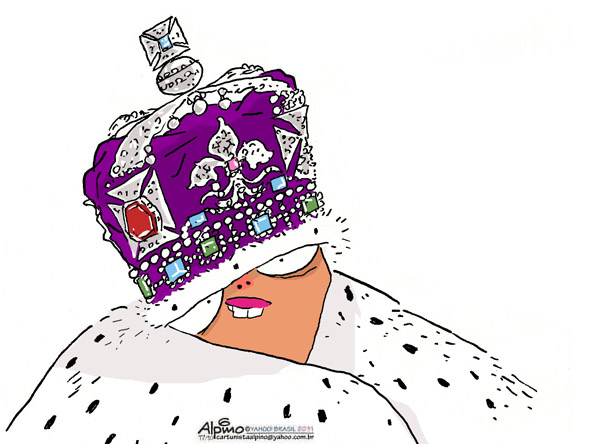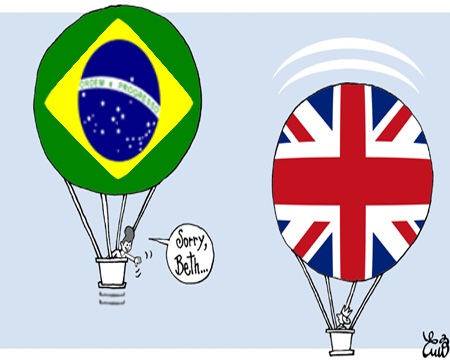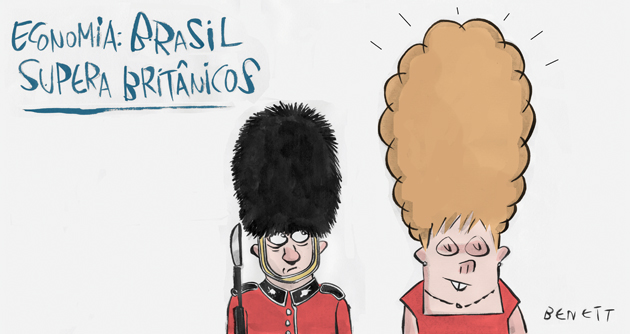The news made headlines in virtually all media outlets in Brazil in the last week of 2011: Brazil has overtaken UK as the sixth-largest economy in the world. Quoting the December 26, issue of British newspaper The Guardian [1], the news reported on a forecast [2] by the Centre for Economics and Business Research stating that the country will end the year with the sixth largest GDP worldwide: $2,500 billion.
Being the first time that Britain has lagged behind a South American country in this kind of ranking, the news evoked a humorous comment by Cebr Chief Executive Douglas McWilliams: “Brazil has beaten the European countries at soccer for a long time, but beating them at economics is a new phenomenon”.
In the country, the news also brought good humour, as shown by a collection of illustrations in Humor Político [3] (Political Humour) [pt] blog.
 [4]
[4]Crowned Dilma Rousseff, President of Brazil. Illustration by Alberto Alpino Filho, published in Yahoo! Brasil and republished with permission.
The Sarico Blog [5] [pt] elected the news as the best of the year:
Esta é, sem nenhuma dúvida, a maior notícia de 2011. E esta boa nova é fruto de um trabalho de muitas mãos, começado há 20 anos. Construir uma nação como o Brasil, requer muitas mãos e um longo período recheado de altos e baixos e com muita dúvida. O País do futuro tem nome e cores e fala português.
Viva o Brasil!
No doubt this is the biggest news of 2011. And this good news is the result of the work of many hands, starting 20 years ago. Building a nation such as Brazil requires many hands and a long time, full of ups and downs, and with much uncertainty. The country of the future has a name and colours and speaks Portuguese.
Hooray Brazil!
For the financial manager Hamilton Silva [6] [pt], Brazil heads to fifth place on the world league table of leading economies and a future even more promising awaits. He commented in his blog:
Todos esses fatores e um otimismo das autoridades levam o país a crescer muito mais que o previsto, ou seja, poderemos sim atingir uma posição mais confortável. A quinta posição econômica mundial revela que a nação brasileira deverá ter papel de destaque no Conselho de Segurança Permanente da ONU, deve ser ouvido de forma mais efetiva na OPEP e precisa ser respeitado quando for acionado na Organização do Comércio e outras. Deve ter papel destaque no G8, G20 e demais organismos internacionais, como FMI e Haia, enfim chegamos.
If Brazil is doing well in the Gross Domestic Product (GDP) maths, the same cannot be said of its position in the Human Development Index [7] (HDI), which measures quality of life in each country. Economist Frederico Matias Bacic [8] [pt] unravel the news, explaining why “we cannot boast.” He recalls that:
O crescimento do PIB mostra que ocorreu um aumento da atividade econômica (pode-se dizer que esse crescimento acarreta em geração de empregos e renda), o que é formidável, mas não mostra uma melhora social efetiva. Temos o sexto maior PIB do mundo, mas se olharmos o IDH (Índice de Desenvolvimento Humano) ocupamos a posição 84°, estamos atrás de países como Trinidad Tobago. México, Argentina, Bahamas. Se observarmos o PIB Per capita a nível mundial ocupamos a 76º posição.
O que quero dizer como essa pequena postagem é que existem índices econômicos/sociais mais importantes que o PIB para serem observados. Ter simplesmente um dos maiores PIBs do mundo não quer dizer, por si só, que estamos indo bem, é preciso olhar uma gama de dados, não podemos nos vangloriar em cima de uma única variável. Para ilustrar melhor o que quero dizer imaginemos o seguinte: que todos os países da África se unissem formando uma nova nação, com certeza, esse novo país teria um dos dez maiores PIBs do mundo, mas isso não quer dizer que se tornariam desenvolvimentos e socialmente justos. Seria apenas um grande país, com um grande PIB, como uma grande população miserável, repleto de problemas sociais.
GDP growth shows an increase in economic activity (we can say that this growth leads to jobs and increased income), which is fantastic, but it does not show an effective social betterment. We have the sixth largest GDP in the world, but if you look at the HDI (Human Development Index), we occupy the 84th position, well behind countries such as Trinidad and Tobago, Mexico, Argentina, Bahamas. If we look at GDP per capita in the world, we occupy the 76th position.
What I mean with this little post is that there are more important economic/social indicators than GDP to be looked at. Having just one of the highest GDPs in the world does not mean, by itself, we are doing well, you need to look at a range of data, we cannot boast over a single variable. To better illustrate what I mean, imagine this: that all African countries unite to form a new nation. Of course, this new country would be in top ten GDP ranking in the world, but this would not mean that it would become socially developed and just. It would just be a big country with a large GDP, with a large, miserable population, full of social problems.
Also looking at other indicators, journalist Sérgio Utsch [10] [pt] urges caution. He warns:
O perigo dessa notícia que atiça o orgulho nacional é a cegueira que ela pode gerar. Mais importante do que termos um bolo enorme é que todos consigam comer um pedacinho digno. O “adversário” que acabamos de ultrapassar na tabela do campeonato econômico conseguiu fazer isso, enquanto nós brasileiros nos afogávamos num imenso oceano cheio de corruptos, ditadores e incompetentes. Tudo bem que o fermento do bolo inglês não anda funcionando muito bem, mas por aqui, ao contrário do Brasil, a maioria já tem um pedacinho garantido.
Economist Rodrigo Constantino [11] [pt] says one just needs to look around the country to see that there is nothing to celebrate in poverty, crime, illegitimate concentration of income through corruption and impunity, among other social problems. He asks:
Sim, somos o sexto PIB do mundo. Sim, passamos o PIB do Reino Unido. E daí? Com tantos problemas que nos saltam aos olhos diariamente, é o caso de perguntar: Who cares?! Alguém aí melhorou de vida após saber desta notícia? Então que tal voltarmos nossa atenção para a imensa quantidade de problemas que temos de resolver para tornar o Brasil um país melhor, mais próspero, livre e justo?
Daisy [12] [pt] shows optimism without losing common sense. She even keeps the celebration for a more opportune time:
Vamos celebrar quando alcançarmos o mesmo padrão de vida dos britânicos!
According to the Cebr [2], the ranking of the largest economies is led by the United States, followed by China, Japan, Germany, France, Brazil and the United Kingdom. According to the International Monetary Fund (IMF), Brazil's GDP in 2011 should amount to $2,518 billion, which confirms the projections of the Cebr. In 2010, Brazil was in 7th place, with $2,090 billion GDP.

